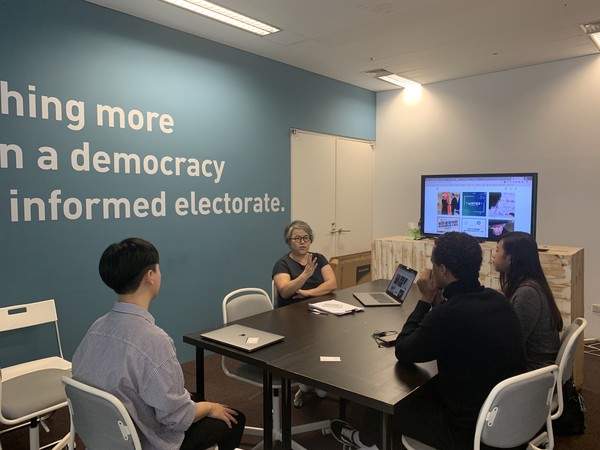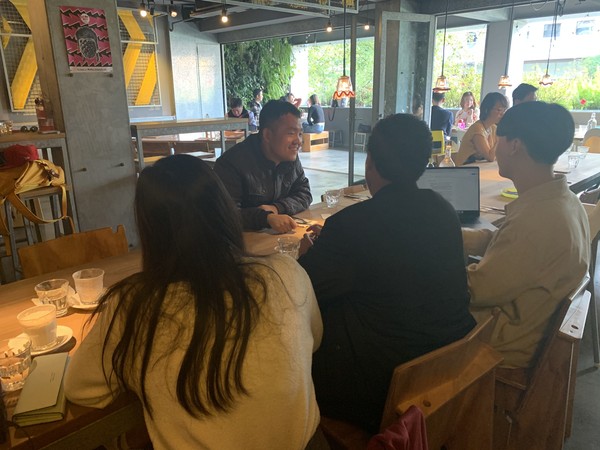Our passion for writing is the main reason why we, reporters of The KAIST Herald, publish the school newspaper. We work hard for our publication, but the busy environment that we live in sometimes hinders us from maintaining it as a priority. Swamped with coursework and trying to keep a personal life, it is very hard to jump from amateur to professional journalism. In January, however, some of our reporters — including myself — had the chance to step beyond amateur journalism and share experiences with two professional journalists based in Taipei, Taiwan. It was an opportunity that helped us to deepen our understanding of important international issues and the work journalists do to report them.
Understanding Taiwan’s Political Landscape
As China is tightening its grip on Hong Kong, there are signs that indicate Taiwan is going to be a hub for international media. Since the coming to power of the highly liberal Democratic Progressive Party (DPP) and President Tsai Ing-wen in 2016, the party’s ideology that Taiwan (officially called the Republic of China) is an independent state is gaining more and more support. The government, which has politically distanced Taiwan from Beijing, has a strong stance on clean energy, pension reform, and LGBT rights. This has helped draw international media attention to Taiwan.
During The KAIST Herald’s trip, we visited the office of The News Lens, an independent media outlet that provides news, analysis, and deep reporting from its offices in Taiwan and Hong Kong. Our trip coincided with the buildup to Taiwan’s January 11 national election that would shape the future of the state. We had the chance to learn a lot about it when we met with Lea Yang, Editor-in-Chief of the organization. Based in Taipei, Yang got her master’s degree in Journalism from The Ohio State University and has been in the industry for over 20 years.
Our long conversation was riveting and broad, but the main topics of discussion were the political landscape of Taiwan and the then-upcoming election. The two main political parties fighting for votes were the incumbent DPP and the opposition Kuomintang (KMT), a party that holds a high place in Taiwan’s history. Even though the DPP was highly popular amongst the majority of young and liberal voters, KMT’s leading candidate Han Kuo-yu, who exploded into the limelight when he surprisingly won 2018’s mayor election in a city considered to be a DPP stronghold, was also quite popular and gaining momentum — to the point where he was even projected to win the national elections based on some surveys. In contrast to DPP, Han and KMT campaigned for more conservative policies and a closer relationship with mainland China. But this line did him no favors in the face of the 2019 Hong Kong protests, with increasing numbers of Taiwanese people worrying about mainland China’s strong actions in Hong Kong, and the potential for the same thing to occur in Taiwan.
On January 11, Tsai recorded a landslide victory over her opposition as the people of Taiwan cast their votes to renew the mandate of the DPP, an overwhelming election that saw the leading government win a greater proportion of the votes than ever before in Taiwan’s history. International media seemed to have nearly completely ignored the bread-and-butter issues though, with almost every media looking to include China in every topic. However, we were able to learn from Yang at The News Lens that this is not the whole story. Elections, for the people of Taiwan, are about more than just their relationship with Beijing; just like any other democratic election, the people vote for the party that they think will improve their lives.
The News Lens office, which looked more like a tech office rather than a news organization, was filled with reporters and software engineers who were working hard to ensure their website was up-to-date with high-quality content, including infographics, videos, and live election coverage. Yang explained that media is evolving in this digital era and that it is important to incorporate technology into their organization as much as traditional journalism.

Combating Fake News as a Freelance Journalist
We also had the chance to meet Randy Mulyanto, an Indonesian freelance journalist based in Taiwan. Despite an educational background in business, he became a contributing reporter in Indonesia, driven by his passion for covering stories that matter to him, such as the lives and experiences of underrepresented communities. After moving to Taipei, and meeting other freelance journalists who provided support and guidance on independent reporting, Mulyanto was able to overcome the challenges he faced in supporting himself as a freelancer. Now his work is being featured in some of the world’s largest media outlets such as Al Jazeera, BBC News, and Vice. He covers a wide range of topics that include Chinese identity in Indonesia, migrant workers in Taipei, and, at that point, pre-election campaigns against fake news.

One topic of discussion during our meeting was fake news and its prevalence in current media. Mulyanto described how dangerous this can be to society, sharing what he witnessed during the last presidential election in Indonesia, which was held in April 2019. Fake news at the time claimed that China was involved in the election to gain influence over Indonesia, leading to negative sentiments toward the Chinese community in the country. When asked about how it was possible to minimize the distribution of fake news, he mentioned the importance of independent fact-checkers and the importance of journalistic integrity without any hidden agenda.
Journalism in its purest form should serve societal good, uphold democracy, shine a light on the marginalized, and be the voice to the voiceless. However, recent times have shown how it can be guided by economic ambitions, political profit, and concealed agendas as well. It was refreshing for us to see a journalist like Mulyanto, who is driven by passion, reporting and telling the stories of underrepresented communities with unmatched optimism and positivity. In addition, The News Lens’ modern approach to journalism was remarkable to watch. It is an independent newspaper, free from the political influences that can cause biased reporting. Yang also believes it’s time for newspapers to move away from traditional, long articles to short ones that would be easily transmitted through social media. A massive lesson learnt, we left Taiwan wondering what the future holds for our own publication, and how we're going to shape it.

